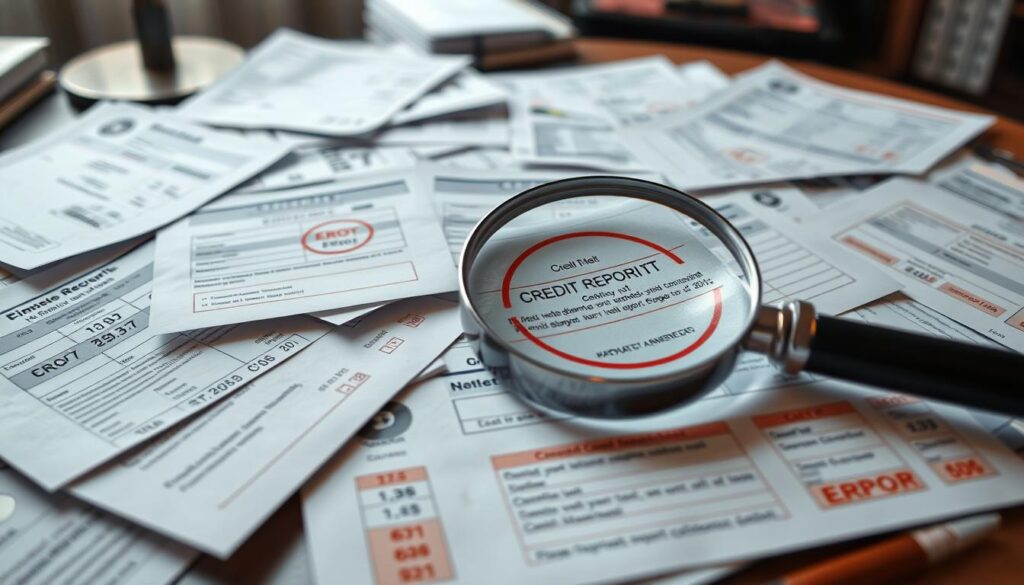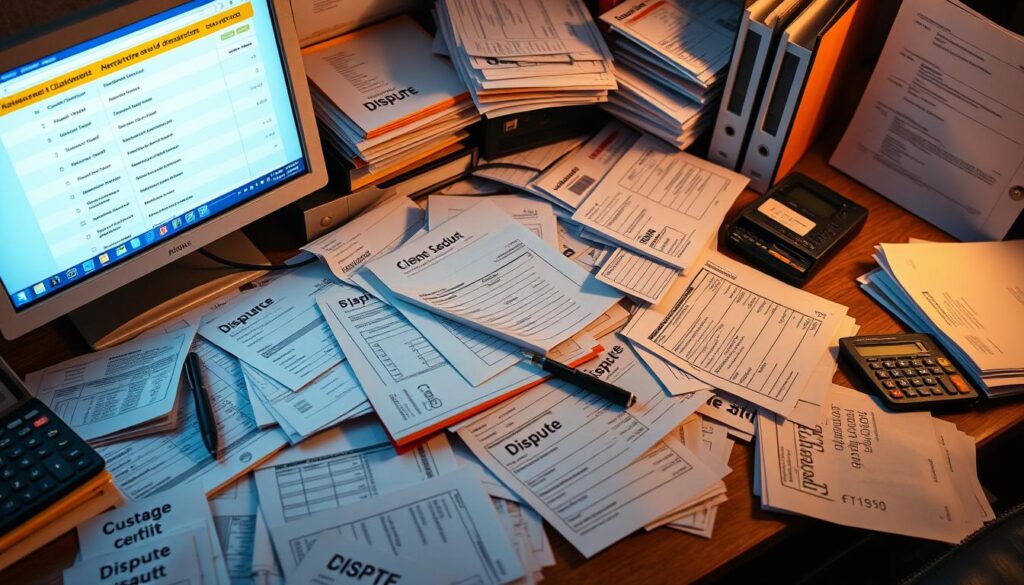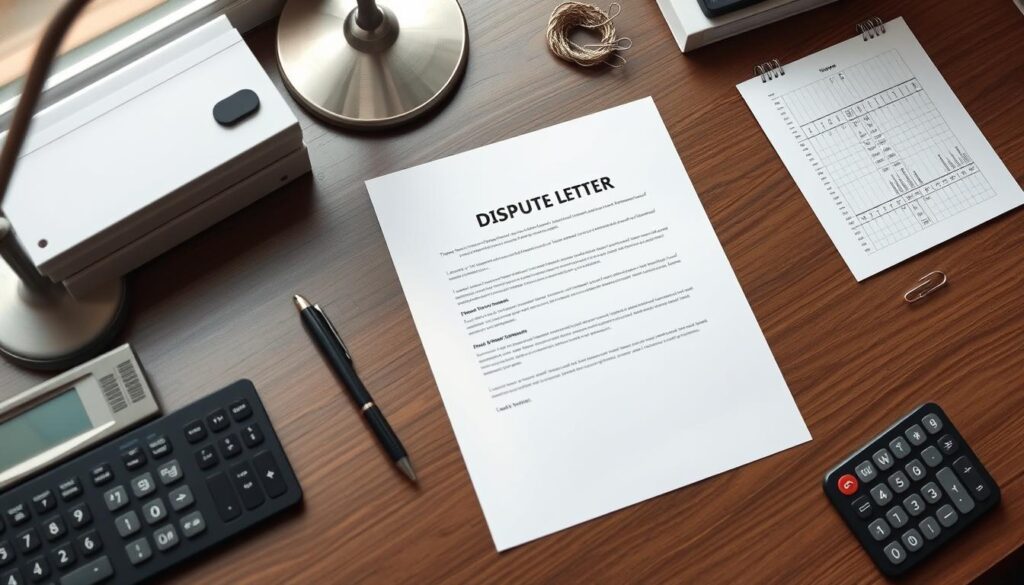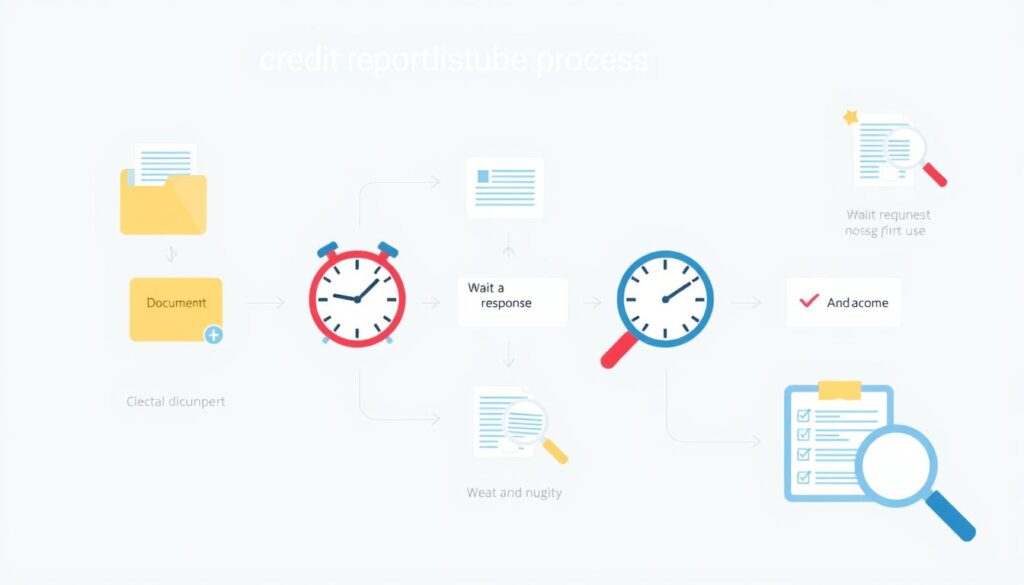Credit report errors can harm your financial health. They can affect your ability to get loans or rent apartments. You can challenge these mistakes through a dispute process with major credit bureaus.
This guide offers a free template for disputing credit report errors. You can use it to correct inaccuracies and improve your credit health. It’s a powerful tool for taking control of your credit profile.
Our template helps you deal with incorrect accounts, identity theft, and other credit bureau mistakes. It gives you the knowledge to navigate the process and achieve success.
Key Takeaways
- Understand the importance of accurate credit reports and the impact of errors on your credit score.
- Learn how to identify common credit report inaccuracies and gather supporting documents.
- Discover the step-by-step process to effectively dispute credit bureau errors using a proven template.
- Explore options for submitting your dispute letter and following up on the resolution.
- Gain insights into preventing future credit report mistakes and maintaining good credit habits.
Understanding Credit Bureau Disputes
Disputing credit report errors is vital for maintaining accurate credit. Mistakes by credit bureaus can hurt your credit score. It’s crucial to challenge these inaccuracies to protect your financial health.
Credit report disputes notify bureaus like Experian, Equifax, and TransUnion about errors. These can include wrong account info, false late payments, or identity theft issues. Challenging mistakes ensures your report reflects your true financial history.
Accurate credit reports are essential. Errors can significantly impact your credit score. This score affects your ability to get loans, credit cards, housing, or jobs.
Unresolved mistakes can lead to higher interest rates. They may also result in denied applications or legal problems. Taking action to fix errors is crucial.
| Common Credit Report Errors | Potential Consequences |
|---|---|
| Incorrect account information | Lower credit score, denied applications |
| Erroneous late payments | Higher interest rates, denied credit |
| Identity theft-related issues | Damaged credit, legal complications |
Understanding the dispute process helps you maintain good financial standing. You can take steps to fix issues and keep your credit healthy. Next, we’ll explore how to effectively dispute credit mistakes.
Importance of Accurate Credit Reports
Your credit report plays a vital role in your financial health. It’s a detailed record of your credit history. This report affects your credit scores and loan terms.
Credit scores impact your ability to get loans and credit cards. They also influence the interest rates you’ll pay. Good credit scores can save you money over time.
Impact on Credit Scores
Errors in your credit report can hurt your credit scores. Incorrect payment histories or fraudulent accounts can lower your scores. Maxed-out credit limits can also negatively impact your creditworthiness.
Low credit scores make it harder to get good loan terms. This can cost you thousands of dollars over time. It’s crucial to keep your credit report accurate.
Consequences of Errors
Unresolved credit report errors can cause serious problems. You might face loan or credit card denials. Higher interest rates are another possible outcome.
These mistakes can even affect your job search or housing options. The impact on your finances can last for years. Regular credit report reviews are essential.
| Consequence | Impact |
|---|---|
| Denied loan or credit card applications | Inability to access the financing you need for major purchases or to build your credit history |
| Higher interest rates | Increased borrowing costs, leading to more money paid over the lifetime of loans |
| Difficulties in finding employment or securing housing | Potential barriers to economic opportunities and stability |

Knowing how errors affect your impact on credit scores is crucial. Understanding the consequences of credit report errors helps you stay proactive. Check your reports regularly and fix any mistakes quickly.
Common Credit Report Errors
An accurate credit report is vital for your financial health. Credit bureau errors happen more often than you’d expect. Knowing common credit report errors helps you spot issues and dispute credit mistakes.
Inaccurate personal information is a frequent credit bureau error. This includes wrong names, addresses, or Social Security numbers. These mistakes can stem from data entry errors or identity theft.
Incorrect account details are another common problem. This covers wrong balances, payment histories, or accounts not belonging to you. Such errors can hurt your credit score and loan prospects.
- Inaccurate personal information
- Incorrect account details
- Fraudulent accounts
- Mistaken identity issues
Fraudulent accounts and mistaken identity can severely damage your credit. Scammers may open accounts in your name, causing unauthorized charges. Your information might get mixed up with someone else’s, creating wrong entries.
| Type of Error | Impact | Potential Consequences |
|---|---|---|
| Inaccurate personal information | Can lead to identity theft or mix-ups with someone else’s credit history | Difficulty securing loans, credit cards, or rental properties |
| Incorrect account details | Can negatively impact credit score and creditworthiness | Challenges in obtaining financing or favorable terms |
| Fraudulent accounts | Can damage credit history and lead to unauthorized charges | Financial and legal consequences, time-consuming dispute process |
| Mistaken identity issues | Can result in someone else’s credit history being attached to your report | Difficulty establishing your own creditworthiness, potential legal issues |
Recognizing these credit report errors is crucial. It allows you to spot and dispute credit mistakes promptly. This helps protect your financial future and maintain a healthy credit score.
Gathering Supporting Documents
Fixing credit report errors starts with careful preparation. Get copies of your credit reports from Experian, Equifax, and TransUnion. Review these reports to spot any mistakes that need fixing.
Note down account numbers, dates, and other details that support your case. This information will help you build a strong argument for your dispute.
Identifying Inaccuracies
Check your personal info for mistakes in your name, address, or Social Security number. Look for accounts that aren’t yours or wrong negative items.
Find proof of the errors, like bank statements or payment receipts. Collect evidence showing the correct information, such as utility bills or ID cards.
- Gather any documents that can prove the inaccuracy, such as bank statements, payment receipts, or correspondence with creditors.
- Collect any evidence that demonstrates the correct information, such as utility bills, leases, or government-issued identification.
- Organize your documents in a clear and logical manner, making it easy to reference and present them as part of your dispute.
Organize your documents clearly. This makes it easy to use them in your dispute. Careful preparation will help you fix errors and improve your credit profile.

Writing an Effective Dispute Letter
A successful credit report dispute letter is vital for fixing errors in your credit history. It formally asks credit bureaus to investigate and correct issues in your report. A strategic approach can boost your chances of a positive outcome.
Key Components of the Letter
Include these essential elements in your dispute letter:
- Personal Information: Provide your full name, current address, and birth date. This helps identify you and your specific credit report.
- Description of the Errors: Clearly outline the errors in your credit report. Include affected accounts, dates, and relevant details.
- Supporting Documentation: Attach copies of documents that back up your claims. These may include payment receipts or creditor correspondence.
- Desired Outcome: State what actions you want the credit bureau to take. This could be correcting errors or removing disputed items.
- Contact Information: Include your current phone number and email address. This allows the credit bureau to reach you easily.
Following this structure helps you create an effective write effective dispute letter. It clearly communicates your concerns and increases chances of resolving key components of credit dispute letter.
“A well-crafted dispute letter helps reclaim your credit history. It ensures your financial future is built on accurate information.”
dispute letter to credit bureau template
Credit report disputes can be tricky. A dispute letter to credit bureau template makes the process easier. This tool ensures your letter has all the needed info and follows the right format.
The template helps you challenge credit report errors effectively. It uses a sample credit dispute letter format. This approach increases your chances of success when disputing inaccuracies.
The template covers key elements of a credit dispute. It helps you identify errors and provide evidence. You can request an investigation and outline expected actions.
- Clearly identifying the specific inaccuracies or errors on your credit report
- Providing supporting documentation and evidence to substantiate your claims
- Requesting a thorough investigation and correction of the reported information
- Outlining the specific actions you expect the credit bureau to take
- Clearly stating your desired outcome and the timeline for resolution
Using this template can streamline your dispute process. It boosts your chances of removing wrong info from your credit report. This can improve your credit scores and financial health.

| Key Features of the Dispute Letter Template | Benefits of Using the Template |
|---|---|
|
|
The dispute letter to credit bureau template helps you tackle credit report errors. It’s a powerful tool for protecting your financial health. Use it to reclaim your credit and build a better financial future.
Submitting Your Dispute Letter
You’ve written your detailed credit dispute letter. Now it’s time to send it to the credit bureaus. Choose the right sending options for credit dispute letter to ensure quick processing.
Sending Options
You have several ways to submit your dispute letter:
- Online Portals: Credit bureaus often offer digital submission on their websites. This is a fast and easy way to submit your dispute letter.
- Mail: Send your letter via certified mail or with delivery confirmation. This gives you proof that the credit bureau got your letter.
- Fax: Some credit bureaus accept faxed dispute letters. Keep the fax confirmation as proof of sending.
Follow the credit bureau’s exact instructions when submitting. This helps ensure they handle your dispute correctly.
“Submitting your credit dispute letter correctly is the first step in getting inaccuracies removed from your report.”
Understanding sending options for credit dispute letter is key. Following the right process helps your credit dispute letter get noticed and addressed quickly.
Following Up on Your Dispute
Disputing credit report inaccuracies is vital, but it’s not the end. Following up on your credit dispute ensures a successful resolution and maintains your credit profile’s integrity.
The credit report dispute process can be lengthy. Staying proactive and tracking your case’s progress is crucial. Here’s what you should know about following up:
- Monitor the timeline: Credit bureaus must respond within 30-45 days. Follow up if you don’t hear back in time.
- Review the investigation results: Examine the findings carefully. Ensure inaccuracies are addressed and your credit report is updated.
- Communicate with the credit bureau: If unsatisfied, ask for a detailed explanation. You can dispute results if issues remain unresolved.
- Document everything: Keep records of all communications. Note dates, names, and actions taken. This documentation may be needed later.
Persistence is key in the follow up on credit dispute process. Monitor progress and advocate for your rights.
By staying vigilant, you can achieve a satisfactory resolution. This helps maintain the accuracy of your credit profile.

Handling Persistent Credit Errors
Persistence is crucial when disputing credit report errors. If your issues remain unresolved, it’s time for further action. Learn how to effectively communicate with credit bureaus and seek legal help when needed.
Escalation Steps
When initial disputes fail, consider these steps:
- Communicate with the Credit Bureaus – Contact them again with more evidence. Clearly explain why the errors still exist. Persistence and clear communication can make a difference.
- File Complaints with Regulatory Bodies – If bureaus don’t respond, complain to the Consumer Financial Protection Bureau (CFPB). Your state’s consumer protection agency can also help investigate and intervene.
- Seek Legal Assistance – If bureaus ignore you or errors significantly impact your finances, consult a credit repair attorney. They can advocate for you and take legal action if needed.
Handling persistent credit errors takes patience and diligence. Be ready to escalate if necessary. Protect your credit by ensuring your report accurately reflects your financial history.
“Persistence and clear communication are key when dealing with persistent credit report errors.”
Preventing Future Credit Report Mistakes
Keeping your credit report accurate is vital for your financial health. Adopt proactive strategies and responsible credit habits to avoid errors. These steps will protect your credit info and prevent future headaches.
Check your credit reports from Experian, Equifax, and TransUnion regularly. This helps you spot and fix any errors quickly. Experts recommend checking your credit reports at least once a year, or more frequently if you suspect any issues.
When you find mistakes, dispute them right away. Follow the credit bureaus’ process to correct inaccuracies. This stops errors from spreading and keeps your credit info correct.
Develop good credit habits to prevent future mistakes. Pay bills on time and keep a healthy credit utilization ratio. Avoid too many credit inquiries to build a strong credit history.
“Protecting the accuracy of your credit report is an ongoing process, but the benefits are well worth the effort. By taking proactive steps and maintaining good credit habits, you can safeguard your financial future and avoid the headaches associated with credit report errors.” – Financial Advisor, John Smith
Monitoring Your Credit Reports Regularly
- Review your credit reports from all three major bureaus at least once a year
- Set calendar reminders to check your reports on a consistent basis
- Look for any suspicious or inaccurate information that needs to be addressed
Disputing Errors Promptly
- Identify any inaccuracies or errors on your credit reports
- Gather supporting documentation to substantiate your dispute
- Follow the appropriate dispute process with the credit bureaus
- Monitor the status of your dispute until it is resolved
Developing Responsible Credit Habits
| Responsible Habit | Benefit |
|---|---|
| Making payments on time | Demonstrates creditworthiness and avoids negative items on your credit report |
| Maintaining a healthy credit utilization ratio | Keeps your credit usage within recommended limits, which positively impacts your credit score |
| Limiting credit inquiries | Excessive credit applications can negatively affect your credit score and appear on your report |
Use these strategies to prevent future credit report mistakes and maintain good credit habits. Your credit info will stay accurate and secure. Remember, smart credit management protects your financial well-being.
Credit Repair Services
Credit repair services can help fix credit report errors. They offer expertise in handling credit disputes and rehabilitation. These professionals can improve your overall credit profile.
Pros of Credit Repair Services
- Expertise in credit report analysis and dispute process
- Ability to identify and challenge inaccuracies on your credit report
- Assistance in gathering and organizing supporting documentation
- Negotiation with creditors and credit bureaus on your behalf
- Ongoing monitoring and proactive management of your credit profile
Cons of Credit Repair Services
- Potential for high fees, which can vary significantly across providers
- No guarantee of success in removing all negative items from your credit report
- Requirement to provide personal and financial information to the service provider
- Potential for unethical or deceptive practices by some credit repair companies
- Time-consuming process that may not yield immediate results
Think about the benefits and drawbacks of credit repair services. Research different providers to make a smart choice. Choose a service that fits your credit repair needs and budget.
| Feature | Benefit | Drawback |
|---|---|---|
| Expertise in credit report analysis | Ability to identify and challenge inaccuracies | Potential for high fees |
| Negotiation with creditors and credit bureaus | Representation and advocacy on your behalf | No guarantee of success |
| Ongoing credit monitoring and management | Proactive approach to maintaining good credit | Requirement to share personal and financial information |
Your choice to use credit repair services depends on your situation. Consider your credit status, financial goals, and ability to handle repairs yourself.
Weigh the pros and cons of credit repair carefully. This will help you decide the best way to fix your credit.
Legal Rights and Protections
You have important legal rights when disputing credit report inaccuracies. The Fair Credit Reporting Act (FCRA) governs consumer credit information. It empowers you to challenge errors in your credit report.
The FCRA requires credit bureaus to investigate disputes promptly. They must provide you with the results. You can seek damages if they report inaccurate information or fail to investigate.
The FCRA also bans certain information from credit reports. This includes outdated debts and unverified accounts. Understanding these rights helps protect your credit scores and financial health.
| Key Legal Rights Under the FCRA | Protections Provided |
|---|---|
| Right to dispute inaccuracies | Credit bureaus must investigate and correct errors |
| Prohibition on outdated or unverified information | Ensures your credit report is up-to-date and accurate |
| Right to seek damages for violations | Holds credit bureaus accountable for their actions |
Knowing your legal rights and protections for credit report disputes is crucial. It helps you navigate the credit reporting process confidently. You can ensure your credit report accurately reflects your financial history.
Maintaining Good Credit Habits
Good credit habits are vital for a strong financial future. They help prevent credit report errors and boost your credit profile. Responsible credit usage builds a solid credit history and ensures financial health.
Responsible Credit Usage
Using credit cards wisely is key to good credit habits. This includes paying on time and keeping balances low.
Aim for a credit utilization rate of 30% or less. Avoid applying for too many cards or opening unnecessary accounts.
Regularly check your credit report for errors or issues. Address any problems you find promptly.
- Making payments on time, every time
- Keeping credit card balances low, aiming for a utilization rate of 30% or less
- Avoiding excessive credit card applications or opening new accounts unnecessarily
- Monitoring your credit report regularly to identify and address any errors or discrepancies
Other financial behaviors also contribute to a strong credit history. Pay all bills, including utilities and rent, on time.
Maintain a mix of credit types like cards, loans, and mortgages. Limit the use of high-interest, short-term financing options.
Keep your overall debt-to-income ratio in check. Avoid taking on excessive debt.
- Paying all bills, including utilities and rent, on time
- Maintaining a diverse mix of credit types, such as credit cards, installment loans, and mortgages
- Limiting the use of payday loans or other high-interest, short-term financing options
- Avoiding excessive debt and keeping your overall debt-to-income ratio in check
Make these good credit habits part of your daily routine. They’ll help build a credit profile that shows responsible credit usage.
With these habits, you’ll be on track to achieve your financial goals. Your credit profile will reflect your responsible approach to money.
Additional Resources
Disputing credit report errors can be tough. But don’t worry, help is available. Many resources can guide you through this process.
The Federal Trade Commission (FTC) is a great place to start. Their website has guides on consumer credit rights. It also explains how to dispute additional resources for credit report disputes.
The Consumer Financial Protection Bureau (CFPB) offers helpful tools too. They can teach you about credit reports and scores.
- The Consumer Financial Protection Bureau (CFPB) is another valuable resource, providing an array of educational materials and tools to help consumers understand and manage their credit reports and scores.
- For those seeking personalized assistance, consider reaching out to a credit counseling agency or a consumer advocacy group, such as the National Consumer Law Center or the National Association of Consumer Advocates.
- Additionally, there are numerous online forums and communities where individuals share their experiences and insights on navigating the credit dispute process, offering a wealth of practical advice and support.
To resolve additional resources for credit report disputes, stay persistent and informed. Use these resources to your advantage. They’ll help you achieve the best outcome for your credit report.
Conclusion
Maintaining accurate credit reports is crucial for your financial well-being. This guide has shown you how to challenge inaccuracies step-by-step. Use the dispute letter template and resources to reclaim your financial health.
Your credit report plays a vital role in your financial life. It impacts loans, apartment rentals, and even job prospects. Taking action on errors is essential.
The strategies in this guide will help you navigate credit disputes with ease. You’ll ensure your report accurately reflects your financial history. This paves the way for a brighter financial future.
Take control of your credit report today. It’s a powerful step towards achieving your financial goals. Embrace the benefits of accurate credit reporting for a stronger financial position.

